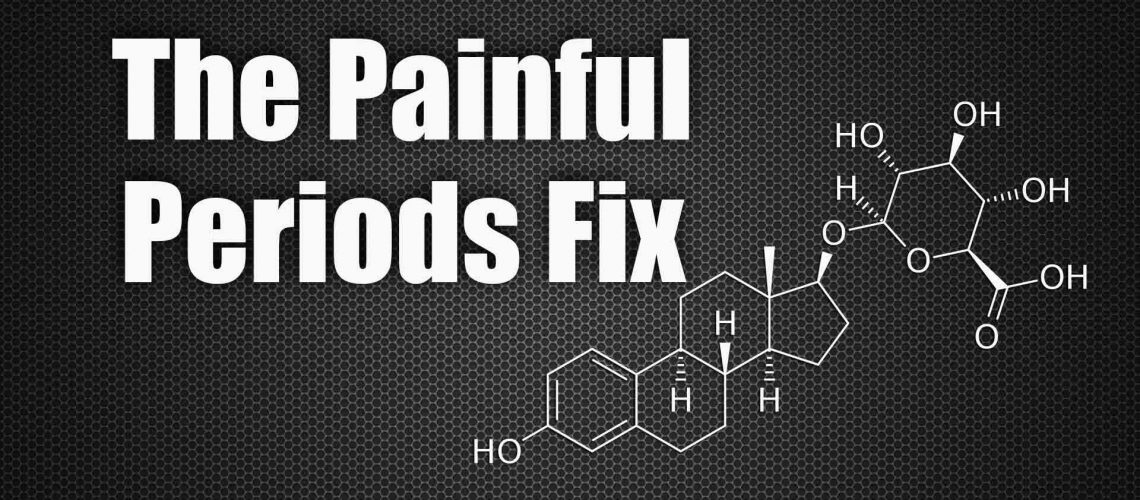This article is for women suffering with heavy periods and painful periods who also struggle with constipation. I go over the relationship between gut bacteria and estrogen metabolism. I also give some suggestions on what you can do to resolve your painful periods. Enjoy!
First let us talk about the role estrogen plays in the menstrual cycle. The simplest explanation is at a certain point every month, the ovaries produce more estrogen to get the uterus ready for a possible pregnancy. Estrogen causes the cells that line the inside of the uterus, known as the endometrium, to grow and thicken. The ovaries also produce progesterone a little later in the menstrual cycle which helps the layer of cells formed by the estrogen to slough off if the woman does not become pregnant. This is what causes menstrual bleeding. The extra cells will flush out of the body.
If your body has too much estrogen and not enough progesterone, you will likely have heavier and painful periods because too much estrogen causes the endometrium to thicken too much. Peeling off a thicker layer of cells is like peeling off a big scab. It’s more painful and causes more bleeding.
The trick to have lighter periods is to lower the estrogen. But how does estrogen become elevated in the first place and what does that have to do with constipation?
Estrogen metabolism.
All the hormones that the body produces will eventually need to be detoxified by the liver to be excreted from the body through the stool or urine. And the liver does a really good job at this. It changes the estrogen molecule by adding something to it through a process called glucuronidation. This inactivates the estrogen molecule and makes it more water soluble so that it can be removed from the body.
For most people, the glucuronidated or inactivated estrogen molecules will make their way down the digestive tract and will be eliminated from the body within 24 hours. However, if you have constipation, meaning you don’t have a bowel movement every day, then the amount of time that the inactivated estrogen molecules stay in the digestive tract is increased. So instead of it taking 24 hours for your body to get rid of the inactivated estrogen it takes longer. This increases the probability that gut bacteria will come in contact with the inactivated estrogen molecules and reactivated them.
Certain species of gut bacteria have an enzyme called beta-glucuronidase which essentially reactivates the estrogen. When that happens, the reactivated estrogen gets reabsorbed by the body. Due to this, the body will end up having too much estrogen, resulting in a thicker endometrium and heavy periods. This is the relationship between constipation and heavy periods. Having a slower bowel movement transit time (constipation) increases the likelihood that gut bacteria will reactivate estrogen.
To correct this, we need to fix the constipation.
To start, magnesium is an excellent stool softener. You can take this daily to help get things moving.
The next step is to determine potential causes of your constipation. The first diagnostic test to have done is a food sensitivity test. This is a blood test that tells you which foods your immune system is reacting to and from that information you can do a focused elimination diet. It typically takes 2-3 weeks of avoiding certain foods to notice any difference in your constipation.
If you’re a do-it-yourself type of person or you just don’t have the funds to pay for food sensitivity testing, then you can do an elimination diet without the test. For instructions on how to do that watch my video called “How to do an Elimination Diet”.
If food sensitivity testing and the elimination diet don’t help, then there may be some other causes such as a longer than usual colon or something else. You will definitely need professional guidance on this so find a good Naturopathic physician to help you figure it out.
Once the constipation is resolved, it usually takes about 3 menstrual cycles for the hormones to balance out and your painful periods to subside.
There’s other things you can do to improve estrogen metabolism as well. Check out my video called “How to Reduce Estrogen Dominance” for more information.
And that’s it… If you’re suffering with heavy and painful periods and you also have constipation, fixing the constipation may just be your ticket to having pain-free periods.
